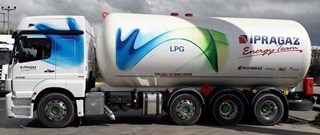Our road tankers were operating with old Euro 3 engines which were not as fuel efficient – and produced more greenhouse gas emissions – than more modern engines. At the same time, driving requirements had changed. We had a smaller number of customers located near our terminal, which meant that our tankers were driving longer distances to deliver LPG. We were also looking at increasing our tanker capacity to decrease the number of kilometres driven.
65 new road tankers for reduced emissions
Based on these factors, we replaced our old road tankers with 58 brand new 33.3 m³ Euro 5 and Euro 6 LPG road tankers in 2016. We also added seven new Euro 6 engine-powered 23 m³ LPG road tankers to the fleet in 2017, with the purpose of gas reduction. Engine technology has advanced, meaning that the new engines are more fuel efficient and create lower emissions. Euro 5 and Euro 6 engines run with up to 22% less diesel compared to the Euro 3 engines. They also lower nitrogen oxide (NOx) emissions by up to 80%, as well as decreasing emissions of particulate matter (PM), carbon monoxide (CO) and hydrocarbons (HC) significantly.
More deliveries, fewer tankers and fewer kilometres
Now, our road tankers can carry 40% more LPG, which means more deliveries using fewer tankers while driving fewer kilometres. Taking into account both fuel efficiency and carrying capacity, our new road tankers now consume 14% less diesel per kilometre driven. This information makes it easy to calculate the result of our fleet optimisation project. In 2017, our new 33.3 m³ tankers drove 6.6 million kilometres (a reduction of 1.8 million kilometres) and consumed 706 thousand fewer litres of diesel. We drove 311 thousand kilometres with our new 23 m³ tankers in 2017, consuming 16 thousand fewer litres of diesel. As a result, we reduced our CO2 emissions by 1912 tonnes. In other words, we managed to decrease the carbon footprint of our LPG tanker fleet by almost 9.2% by driving and consuming less.


 }
}
 }
}
 }
}
 }
}